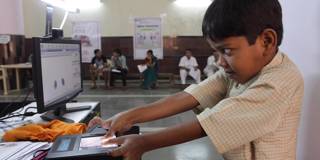New technology, institutions, and regulations can help countries to re-imagine education and health, build human capital, and prepare their youth for the jobs of tomorrow. India's successes should inspire other developing countries to embrace equally bold and inclusive digital ambitions.
OXFORD – Digital technology can rapidly transform how countries provide services such as education and health to their citizens. The public services of the future should be effective, efficient, fair, data-driven, and responsive to individual needs. And the groundwork to turn this vision into reality needs to be laid now.
Managed wisely, data can be the key to providing quality health and education services for all – at speed, at scale, and in a sustainable way – and to boosting social and economic inclusion. Alongside these exciting opportunities, countries must also anticipate and manage the associated risks of the digital revolution. To this end, India’s pioneering use of data and technology offers four lessons for other developing countries.
First, scale should be built into project design from the very beginning, instead of being an afterthought. In India, we must think about how we can help one million community health workers provide health care to rural areas, and how we improve the skills of 100 million young people seeking better jobs. The world must ask a similar question: How can we provide safe, high-quality vaccinations to 20 million infants around the world, and educate the more than 260 million children and youth who are not in school?

OXFORD – Digital technology can rapidly transform how countries provide services such as education and health to their citizens. The public services of the future should be effective, efficient, fair, data-driven, and responsive to individual needs. And the groundwork to turn this vision into reality needs to be laid now.
Managed wisely, data can be the key to providing quality health and education services for all – at speed, at scale, and in a sustainable way – and to boosting social and economic inclusion. Alongside these exciting opportunities, countries must also anticipate and manage the associated risks of the digital revolution. To this end, India’s pioneering use of data and technology offers four lessons for other developing countries.
First, scale should be built into project design from the very beginning, instead of being an afterthought. In India, we must think about how we can help one million community health workers provide health care to rural areas, and how we improve the skills of 100 million young people seeking better jobs. The world must ask a similar question: How can we provide safe, high-quality vaccinations to 20 million infants around the world, and educate the more than 260 million children and youth who are not in school?